Thanks for your support! If you make a purchase using our links in this article, we may make a commission. And, as an Amazon Associate, I earn from qualifying purchases. See the full disclosure here.
RV refrigerators are a great way to keep food and drinks cold while on the road, but they can drain your RV’s power supply. Running your RV refrigerator on solar power is an increasingly popular option, but it’s tricky to do it right.
Many RVers believe that their RV refrigerator gets solar power directly or that their house batteries automatically feed all of their RV’s electronics without assistance. But this isn’t the case since solar panels don’t directly feed energy into the refrigerator or any other electronic device.
This article helps dispel the myth about running an RV refrigerator on solar power and other alternative energy sources. We discuss how much wattage the RV refrigerators use and what kind of setup they need.
You will also learn nine things to look for in a refrigerator for your RV so you can make the best choices for your needs.
Does Solar Energy Truly Power RV Refrigerators?
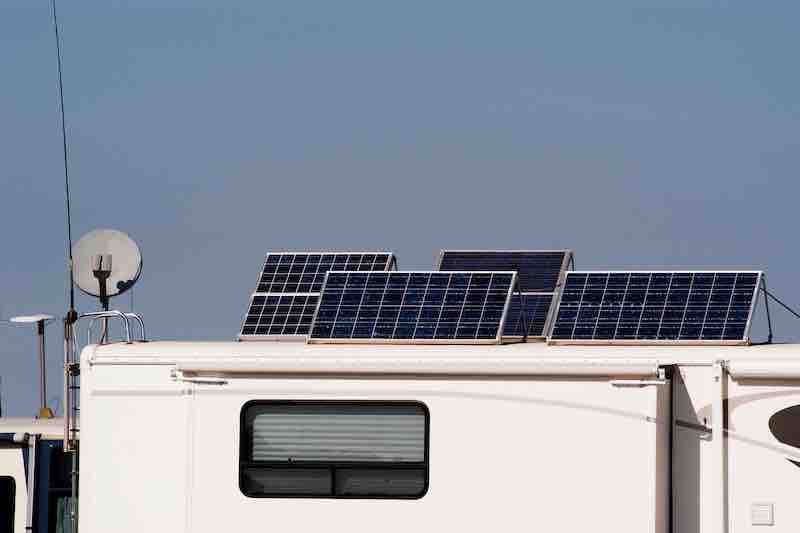
Solar panels do not directly power RV refrigerators. Instead, the panels charge the RV’s batteries, which power the fridge.
Your RV has two separate electrical systems: a 12-volt DC (direct current) and a 120-volt AC (alternating current) system. Batteries that power the fridge, water pump, and lights supply the 12-volt system. The 120-volt system is like the electrical system in your home and powers things such as the microwave and air conditioner.
Solar panels convert sunlight into electrical energy. You charge the batteries using this electricity, which can then run the refrigerator and other 12-volt power appliances.
For this system to work effectively, it is essential to position the solar panels correctly to keep the batteries charged. You can ensure that your RV refrigerator will always have a reliable power source by keeping these things in mind.
How Much Solar Power Do I Need for My RV Refrigerator?
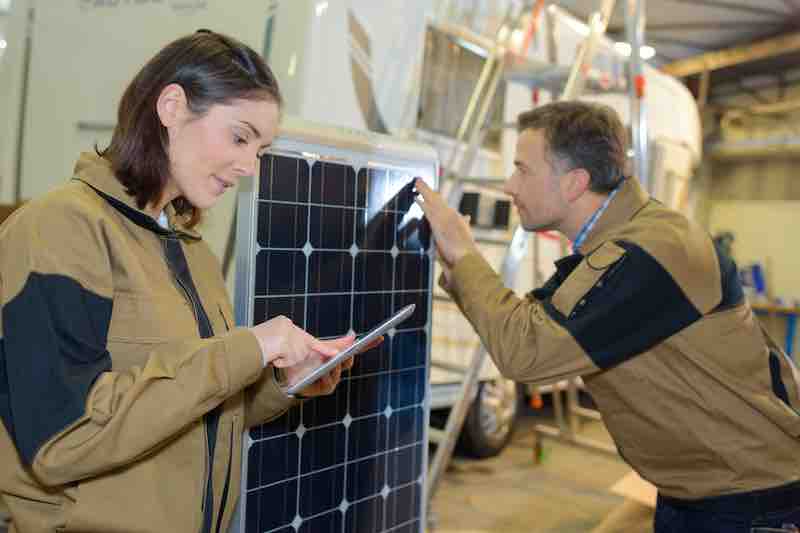
Any RVer who has gone off the grid knows solar panels are a great way to power your RV. Not only are they environmentally friendly, but they are also very efficient.
However, before you can take advantage of solar power, you need to know how much solar power you need for your particular RV refrigerator.
The capacity of a solar panel is measured in watts. To calculate the wattage of your fridge, simply multiply the amps by the volts.
Apps x Volts = Watts
Most RV refrigerators require 40 watts per hour or 960 watt-hours in a 24-hour period, which translates to 80Ah (Amp hour). Therefore, you will need a 160Ah deep-cycle lead-acid battery since you cannot drain those batteries past 50%.
However, a single 100Ah Lithium-Ion (LiFePO4) battery that can be drained down to 80-90% could power the RV fridge as long as it’s the only powered electrical device.
A good rule of thumb is choosing solar panels that can produce at least twice the amount of power your RV’s fridge uses.
For example, if your fridge uses 100Ah of power, you’ll want a 200-watt solar panel. This will ensure that you have enough ability to run your fridge and other appliances without draining your battery.
Also, keep in mind that your RV’s battery will only store a certain amount of power, so it’s important to choose a solar panel that can produce more energy than you need to prevent total battery drain.
RELATED READING:
1. Can Solar Panels Really Power an RV Air Conditioner?
2. 8 Easy Ways to Get Water When Boondocking
3. How Long Will an RV Fridge Run on Propane?
4. How To Keep Your RV Fridge Cold While Traveling
5. Can RV Refrigerator Fans Make Your Fridge Cooler?
What is the Best Battery Setup to Run an RV Fridge?
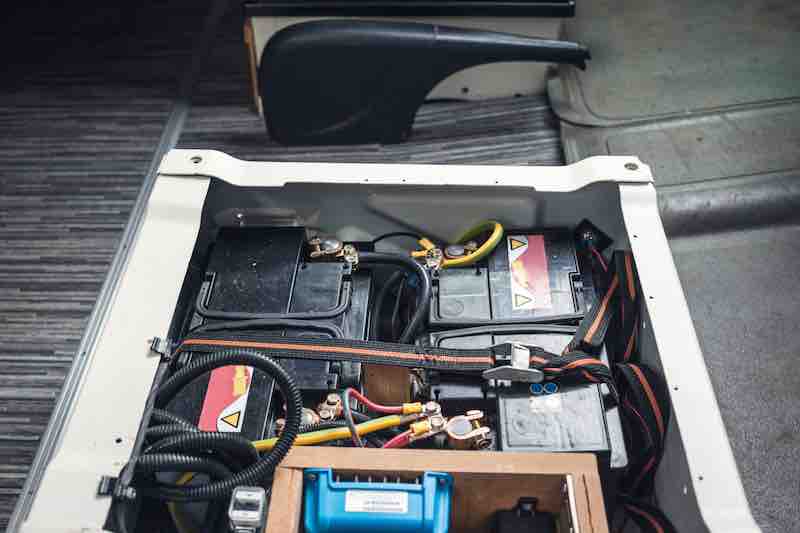
The best battery setup for an RV fridge is one that includes two deep-cycle batteries.
Deep-cycle batteries provide a steady stream of power over an extended period, making them ideal for running a fridge. In addition, you can easily recharge them using a generator or solar panels.
Three deep-cycle batteries can be used for those looking for an even more efficient setup. This will provide enough power to run the fridge even if one of the batteries is not fully charged.
RV manufacturers have long used lead-acid batteries to power their vehicles. They are cheap and reliable, but they have some drawbacks.
Lead-acid batteries are heavy and can only be stored upright, limiting their usefulness in RVs often cramped for space. Batteries made of lead-acid are less durable than lithium-ion batteries.
Lithium-ion batteries are quickly becoming the preferred choice for RVs for several reasons:
- They weigh less than lead-acid batteries
- LiFePO4 batteries can be stored sideways, which is helpful in RVs where space is at a premium.
- Lead-acid batteries have a shorter lifespan compared to their lithium-ion counterparts.
- The charging time on a lithium-ion battery is much quicker than on a lead-acid
- You can store a LiFePO4 battery inside your RV since it does not give off the lead acid’s toxic fumes.
Can I Run My Residential Fridge off Solar Power?
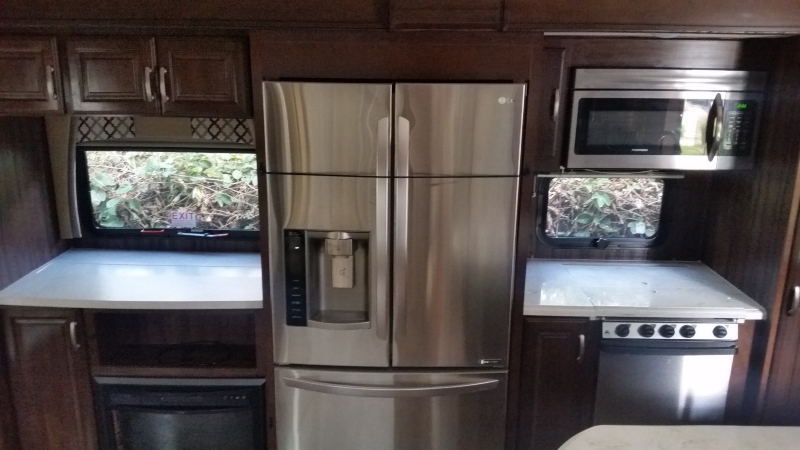
One of the most frequently asked questions by those who want to boondock or dry camp is whether their RV’s residential fridge can run off solar power.
The simple answer is yes, your RV fridge can run off solar power. However, there are a few things you need to consider before making the switch.
First, you will need to ensure that your solar panels are big enough to generate between the 200-400 watts you need to power your fridge.
Second, you will need to have a deep cycle battery that can store the solar power you generate during the day so that it is available at night when your fridge needs it most.
Finally, you will need to have an inverter that can convert the DC power from your batteries into AC power your fridge can use.
When shopping for an RV inverter, one of the most important factors is the type of refrigerator you have.
If you have a larger fifth wheel or Class A motorhome, you have a residential refrigerator that includes a separate inverter just for the fridge.
However, if you purchase a larger capacity Pure Sine Wave inverter, you will only need one inverter instead of two that can cover both your RV and fridge.
9 Things to Look for in a Fridge for Going Off-Grid

Some people may think going off-grid means giving up on modern conveniences. But that does not have to be the case, especially for your fridge.
There are a number of great off-grid fridges on the market that will help you keep your food cold and your beer icy. And the best part is that they do not have to be expensive.
Here are 9 things to look for in a fridge for going off-grid:
1. RV Fridge With Alternative Power Source Capability
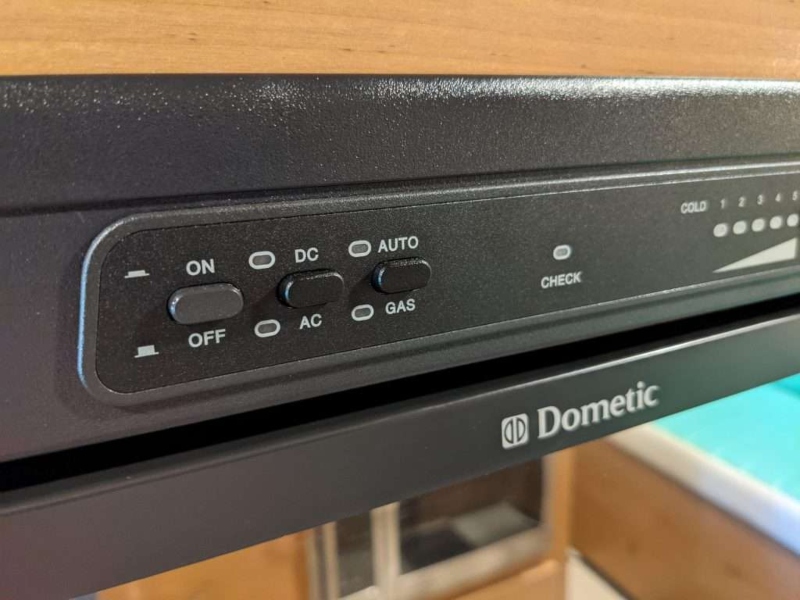
Any seasoned RVer knows that having an RV refrigerator with alternative power capabilities is a great way to travel. It gives you the option of using LP, AC power, and DC power in one unit, but it also allows you to dry camp or boondock without worrying about losing power to your fridge.
There are two main types of alternative RV refrigerator power sources: 2-way and 3-way. A 2-way power source gives you the option of using AC or propane, while a 3-way power source provides AC, DC, or propane power.
If you’re planning to RV off the grid, then a 3-way refrigerator is a good choice so that you always have a backup power source while your batteries are charging.
2. Thick Insulation in Your RV Refrigerator
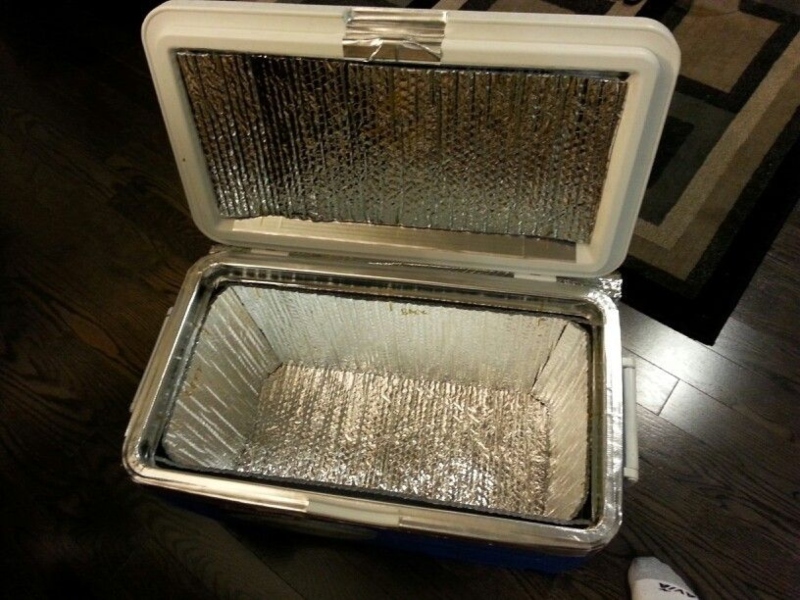
Anyone who has ever owned a fridge knows they can be true beasts regarding energy consumption. In fact, fridges are one of the most common causes of high electricity bills. So if you’re planning on going off-grid, you’ll need to be extra careful about which fridge you choose.
Look for a refrigerator model with thick insulation. The thicker the insulation, the better the fridge will maintain its temperatures. As a result, it will use less power and put less strain on your off-grid power system.
3. High-Efficiency Cooling Technology
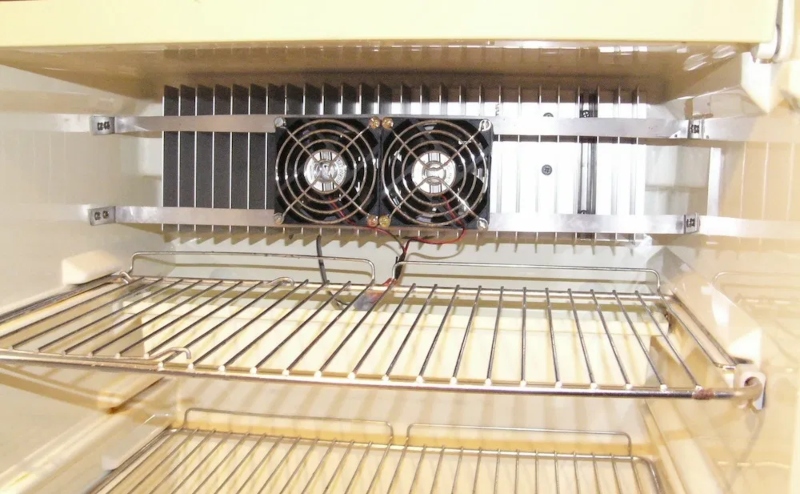
When choosing a fridge for an off-grid lifestyle, it is essential to look for one with high-efficiency cooling technology. Current innovations in cooling technology mean that some fridges use less energy to stay cold, which is ideal if you’re relying on solar power.
In addition, high-efficiency fridges often have features that help to keep food fresher for longer, such as adjustable temperature settings and self-closing doors.
4. A Non-Freezer RV Fridge
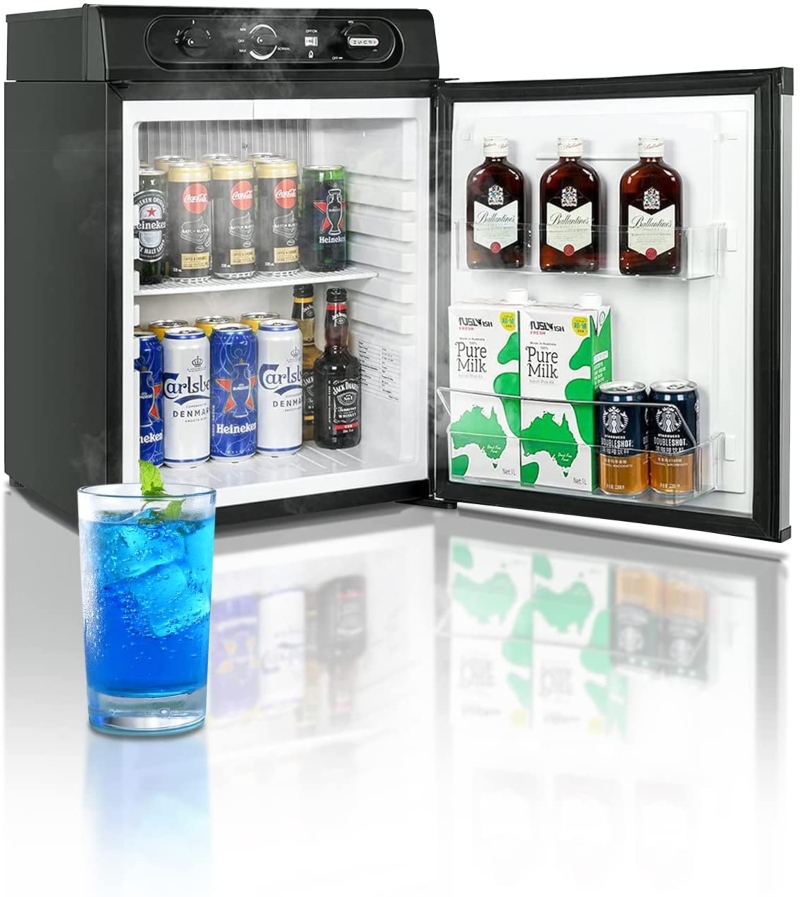
If you’re searching for an off-grid fridge, one of the most important things to consider is whether to get one with a freezer. Because freezers use a lot of energy to maintain their temperatures, they’re not ideal for people who are living off the grid.
If you can live without a freezer, it’s best to choose a fridge that does not have one and get a separate icemaker.
5. 12-Volt Refrigerators
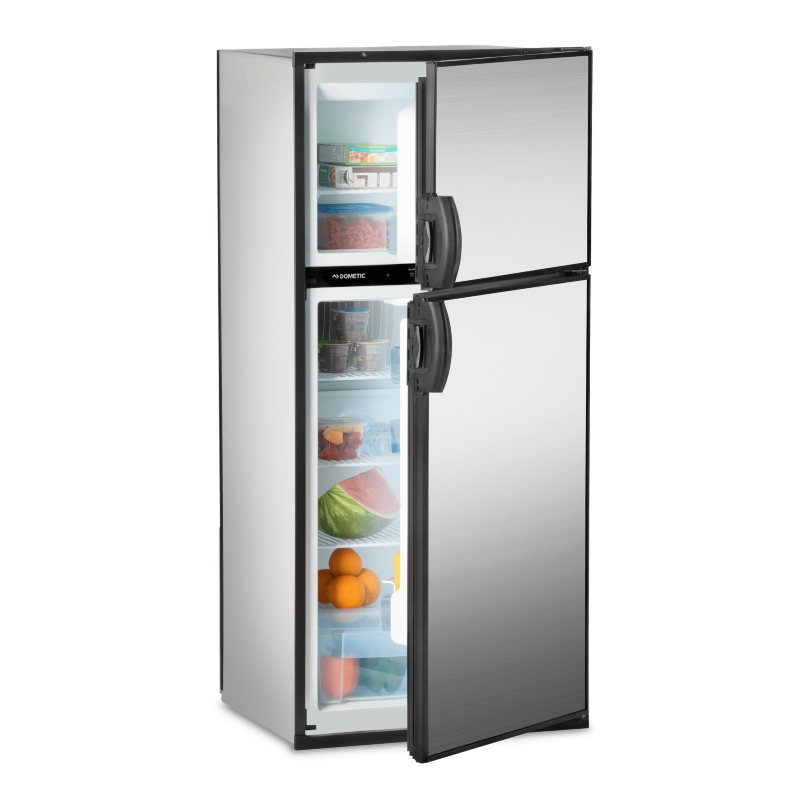
12-volt refrigerators are powered by direct current and can be connected directly to your house batteries. This type of fridge is a great option if you want to save money on an inverter, as you will not need a large-capacity version.
Another benefit of 12-volt refrigerators is that they are usually more energy-efficient than other fridges. If you live off the grid, saving energy is crucial to help stretch your power supply. With a 12-volt fridge, you can be confident that you are using your resources in the most efficient way possible.
6. Best Size RV Refrigerator
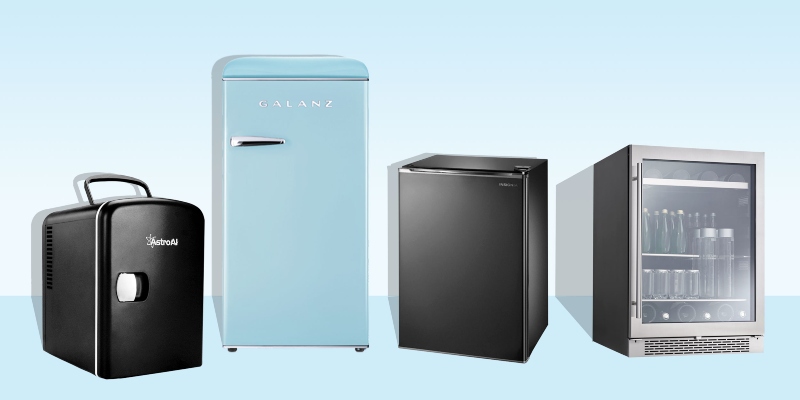
The size of the fridge is one of the most important factors to consider. You will need to choose a big enough refrigerator to hold all of your food, but not so big that it takes up too much space in your RV.
Most RV refrigerators are between four and six cubic feet, but you can find models as small as two cubic feet or as large as 24 cubic feet. The size you choose will depend on the amount of food you need to store and the available space.
Besides capacity, you will also need to consider the space for the fridge. Some fridges fit under countertops, while others are freestanding. So it is essential to measure the space where you want to put your fridge to be sure it will fit.
7. Buy Good Once
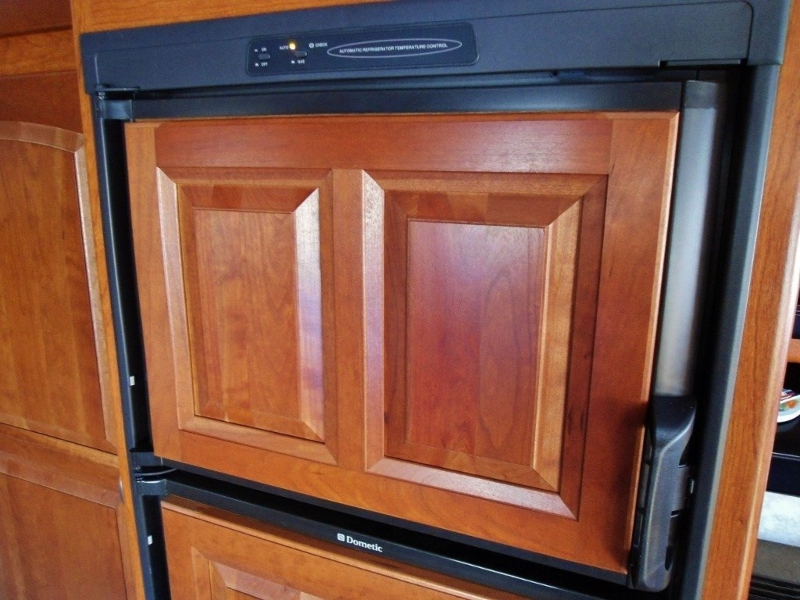
Most people are familiar with the standard household fridge, but there are a few things to consider when choosing a refrigerator for an off-grid lifestyle.
It is important to buy a reliable brand known for its quality. This is especially important if you are traveling a lot, as an RV fridge will need to withstand more wear and tear than a residential fridge.
You will want to look for a fridge with a good energy efficiency rating. Off-grid living can be tough on your power supply, so choosing an appliance that will not strain your system is crucial.
8. Choose the Style Type You Need
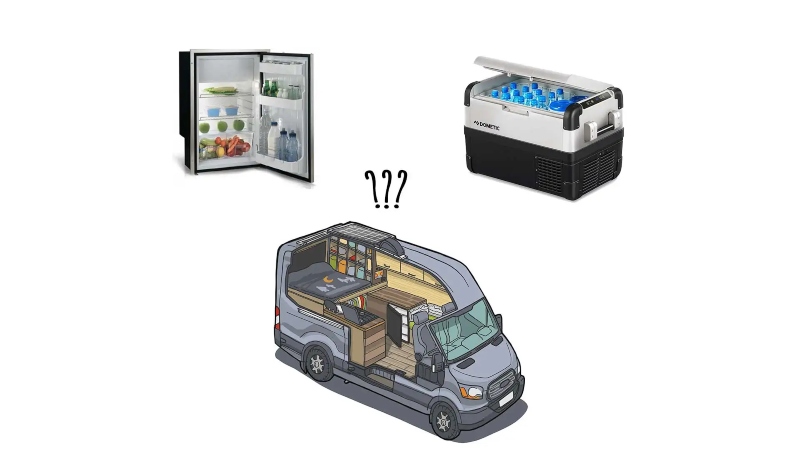
The style and type of fridge you choose will depend on several factors, including the size of your RV and your personal preferences.
The most common type of RV fridge is the door-style fridge, which comes in single or double door models. However, consider a drawer-style fridge or freezer if you’re tight on space.
Some campers and van conversion companies use chest-style fridges for the ultimate in space-saving. These fridges are often placed on drawer slide mechanisms to make them more accessible and create additional surface space.
9. Best RV Refrigerator Price
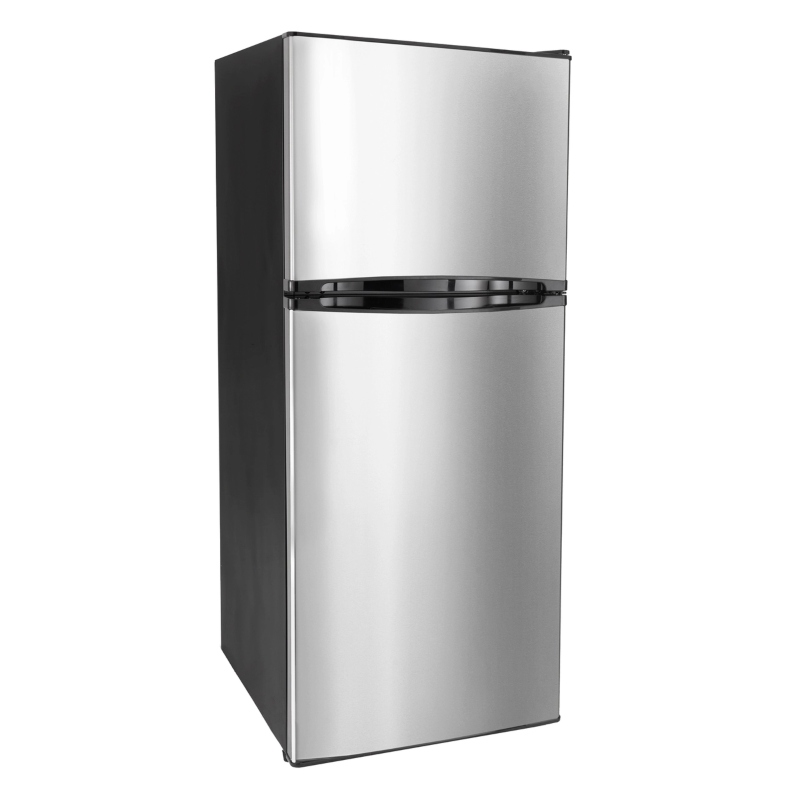
Purchasing an RV refrigerator is a significant investment. 12-volt refrigerators that are suitable for solar may cost up to $2,000. Consider a used or refurbished fridge if you are on a tight budget.
But be sure to look for RV refrigerators with the features you will need to narrow your search and compare prices. You can find some great deals online, but be sure to factor in the shipping cost when deciding.
Final Thoughts About The Truth About Running Your RV Refrigerator on Solar Power
Refrigerators are an essential part of any off-grid kitchen. With some research, you can find the perfect fridge for your needs, whether looking for a compact model for your van or a large one for your motorhome.
Solar power is a great way to run your RV refrigerator and keep your food cold on the road. Using a solar panel and battery bank can easily provide enough power to run even the largest refrigerators. And with proper care, your fridge will last for many years.


Got ta claim this was extremely informative and also nailed a lot of what I was looking for as for what the system is comprised of and also various other details. Thanks a great deal!
Thank you ,very informative